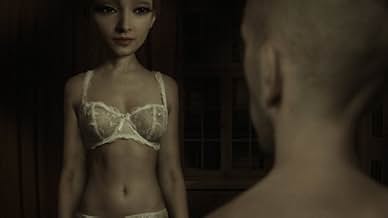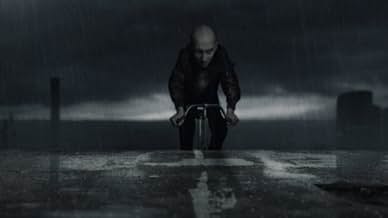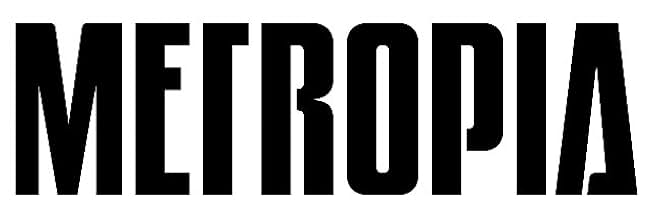IMDb RATING
6.2/10
8.3K
YOUR RATING
A complex story of a misaligned man, though good intent, creating a nightmarish Dystopian existence.A complex story of a misaligned man, though good intent, creating a nightmarish Dystopian existence.A complex story of a misaligned man, though good intent, creating a nightmarish Dystopian existence.
- Awards
- 3 wins & 6 nominations total
Vincent Gallo
- Roger Olofsson
- (voice)
Juliette Lewis
- Nina
- (voice)
Alexander Skarsgård
- Stefan
- (voice)
Sofia Helin
- Anna Svensson
- (voice)
Shanti Roney
- Karl
- (voice)
Fares Fares
- Firaz
- (voice)
Fredrik Eddari
- Mehmet
- (voice)
Indy Neidell
- Wayne Marshal
- (voice)
Joanna Mikolajczyk Winterø
- The Metro
- (voice)
- (as Joanna Zofia Bard Mikolajczyk)
Magnus Skogsberg
- Roger's Boss
- (voice)
- (as Magnus Skogsberg Tear)
Lotta Bromé
- News Anchor
- (voice)
Sandy Mansson
- Office Gossip
- (voice)
Featured reviews
I have watched this move on a hint, haven't expected it to be much, but in the end it turned out swell. The atmosphere created and the style of the movie is excellent. I have really enjoyed it, as it is not heavy, but more tranquil-food-for-thought kind of movie.
The number of allegories in the movie is overwhelming, and there are many connections with how the society functions today.
The low ratings for this movie are almost certainly there because of the complexity of the work, not because it is bad. Getting to IMDb it immediately reminded me about Aronofsky's Fountain, which had (and still has) sub par user rating compared to the quality of the work.
I think that Metropia is worthwhile and enjoyable work, and can recommend it.
The number of allegories in the movie is overwhelming, and there are many connections with how the society functions today.
The low ratings for this movie are almost certainly there because of the complexity of the work, not because it is bad. Getting to IMDb it immediately reminded me about Aronofsky's Fountain, which had (and still has) sub par user rating compared to the quality of the work.
I think that Metropia is worthwhile and enjoyable work, and can recommend it.
It's a story somewhere in the lines of 1984. Dystopian is a genre in itself and it's part of the New World Order conspiracy which has been the theme of many cinema and literature since the 50ies. So yes the core of the story is an old one and all has to come from the graphics, characters and small storyline differences.
In that aspect it's not a masterpiece but it is surely nothing to sneeze at. The animation is very okay. The characters are very average human beings which makes them easy to relate to and likable. The fact that the story is not completely new is not disturbing. Very much worth watching.
In that aspect it's not a masterpiece but it is surely nothing to sneeze at. The animation is very okay. The characters are very average human beings which makes them easy to relate to and likable. The fact that the story is not completely new is not disturbing. Very much worth watching.
One gets accustomed to certain styles of animation, not to mention certain themes. It's either for kids or adults, and it's either 2D or 3D. Of course there are exceptions but for the sake of simplicity, this Manichean duality dominates the market. It's rare that a film emerges that challenges these notions but Tarik Saleh's Metropia does that in fairly interesting ways. The style is an bit of a mash-up between 2 and 3 D - the frames are digitally composited from head shots that have been stretched and squashed then placed on smallish bodies creating creepy caricatures of the actors being photographed. The effect, visually, is of the puppetry in a Thunderbirds (or Supercar) episode as designed by Drew Friedman, with a heavy dose of dark Gilliam"esquire." despair. The animation is stiff, stylized and intentionally rough and jerky. Metropia is not super deep at it core, but it reminds me of the Heavy Metal comics I used to devour when I was a teenager, and that's not at all bad.
It's 2024, the world is running out of oil, and Europe has been connected via a huge subway system. The skies are always gray and it rains all the time. Roger, our protagonist, a bald, hydrocephalic, stoop-shouldered everyman, is afraid to take the metro because he has been hearing voices. He lives with his girlfriend who seems to always be on another planet. One morning, Roger is forced to take the metro because his bike (which he was using illegally anyway) has been destroyed. Sure enough, he begins to hear voices, a voice that has been seeping into his life away from the Metro, on top of everything. On that fateful subway ride, he sees Nina, the spitting image of the girl on his shampoo bottle - a shampoo called Dangst, if that gives any clue as to the relative depth of the film in question. On impulse - despite the urging of the voice in his head - Roger follows Nina, and discovers the world, not far beneath the surface, is not quite what it seems.
As I mentioned, the concepts are pretty thin. The requisite global corporate conspiracy, the rampant consumerism in a dysfunctional dystopia, and the soul-dead protagonist in a souls dead world, are requisite tropes for a film like this. Of course, They have been executed more competently, and in more depth, elsewhere, but the strength of Metropia is its visuals. It is animated for a reason. To that end, the spare, creepy animation style suits the film perfectly. By now, whiz-bang 3D animations are the norm, the rule, so it's at first disconcerting to see animation used so sparingly, minimally and strangely. But this is the point. The world has had all the life and energy sucked out of it, it's no wonder there's not much energy left for the inhabitants of said world. The familiar grey palette allows for even the most subdued tan coat and blonde hair of Nina's to stand out. This lack of movement is also a symbol of conformity. Literally, don't stand out.
Despite its familiar themes, Metropia is worth screening for the simple marriage of form and function it represents. It's a brave filmmaker, who, in this age of Avatar, chooses to make a quiet, simple, creepy film. Saleh, gives us a film, not breathtaking in it's scope, or necessarily ground breaking (except for what it doesn't strive to achieve: mindless spectacle) but calm, understated and worthy, for serious fans of animation, and the brand of sci if familiar to fans of Heavy Metal (the magazine, not the movie).
It's 2024, the world is running out of oil, and Europe has been connected via a huge subway system. The skies are always gray and it rains all the time. Roger, our protagonist, a bald, hydrocephalic, stoop-shouldered everyman, is afraid to take the metro because he has been hearing voices. He lives with his girlfriend who seems to always be on another planet. One morning, Roger is forced to take the metro because his bike (which he was using illegally anyway) has been destroyed. Sure enough, he begins to hear voices, a voice that has been seeping into his life away from the Metro, on top of everything. On that fateful subway ride, he sees Nina, the spitting image of the girl on his shampoo bottle - a shampoo called Dangst, if that gives any clue as to the relative depth of the film in question. On impulse - despite the urging of the voice in his head - Roger follows Nina, and discovers the world, not far beneath the surface, is not quite what it seems.
As I mentioned, the concepts are pretty thin. The requisite global corporate conspiracy, the rampant consumerism in a dysfunctional dystopia, and the soul-dead protagonist in a souls dead world, are requisite tropes for a film like this. Of course, They have been executed more competently, and in more depth, elsewhere, but the strength of Metropia is its visuals. It is animated for a reason. To that end, the spare, creepy animation style suits the film perfectly. By now, whiz-bang 3D animations are the norm, the rule, so it's at first disconcerting to see animation used so sparingly, minimally and strangely. But this is the point. The world has had all the life and energy sucked out of it, it's no wonder there's not much energy left for the inhabitants of said world. The familiar grey palette allows for even the most subdued tan coat and blonde hair of Nina's to stand out. This lack of movement is also a symbol of conformity. Literally, don't stand out.
Despite its familiar themes, Metropia is worth screening for the simple marriage of form and function it represents. It's a brave filmmaker, who, in this age of Avatar, chooses to make a quiet, simple, creepy film. Saleh, gives us a film, not breathtaking in it's scope, or necessarily ground breaking (except for what it doesn't strive to achieve: mindless spectacle) but calm, understated and worthy, for serious fans of animation, and the brand of sci if familiar to fans of Heavy Metal (the magazine, not the movie).
A very unique Scandinavian-English language film from the technical aspect. The only one kind in the whole world which is actually an experimental product from the new productions. It was made primarily using photoshop, and then adobe after effects for animation. If you're wondering what kind it is, actually a 2.5D animation, that means it is neither 2D or 3D, but between those two. Like tricking the 2D object as the 3D material.
Well they have succeeded to bring a visually impressive animation that mainly focused on the film character faces. The story was decent which is another dystopian concept where metro trains are the main content, hence it is called 'Metropia'. But the title also means 'visual refraction', that's what the story is slightly related too.
Anyway, it was very suspenseful till the final and mostly talking drama than physical action sequences. At some point I felt it was like the recent stop-motion animation 'Anomalisa', but realised that I predicted wrong and the story travelled in a different path to end decently. Though the overall film was very impressive from both technical and narrative wise. One must not miss it, just for a its rare kind, especially you like animations, but best suitable for adults.
7/10
Well they have succeeded to bring a visually impressive animation that mainly focused on the film character faces. The story was decent which is another dystopian concept where metro trains are the main content, hence it is called 'Metropia'. But the title also means 'visual refraction', that's what the story is slightly related too.
Anyway, it was very suspenseful till the final and mostly talking drama than physical action sequences. At some point I felt it was like the recent stop-motion animation 'Anomalisa', but realised that I predicted wrong and the story travelled in a different path to end decently. Though the overall film was very impressive from both technical and narrative wise. One must not miss it, just for a its rare kind, especially you like animations, but best suitable for adults.
7/10
I just screened this in advance of its showing at the San Francisco International Animation Festival. It's an interesting film, more for its technique than its narrative. Set in the not-to-distant future in a VERY bleak world, it tells the story of one man's fight against an evil corporation's machinations. Nothing really new narrative-wise, but the plot really isn't the point of this film. It's the animation. The process uses photomontage as its basis, and is quite creepy in its execution. The voice work is well done, and it's always good to see/hear cult film fave Udo Kier. If you enjoyed "1984" or "Brazil," you might want to check this film out.
Did you know
- TriviaAnna wears a T-shirt that says "Maybe he hasn't called because he's washing his hair".
- GoofsWhen Anna is doodling on the mail, it is clearly seen that the debt collection agency has spelled its business as "dept collection".
- ConnectionsReferenced in Stockholms 20th International Film Festival (2009)
- How long is Metropia?Powered by Alexa
Details
Box office
- Budget
- SEK 32,000,000 (estimated)
- Gross worldwide
- $81,305
- Runtime
- 1h 26m(86 min)
- Color
- Sound mix
- Aspect ratio
- 1.85 : 1
Contribute to this page
Suggest an edit or add missing content






































